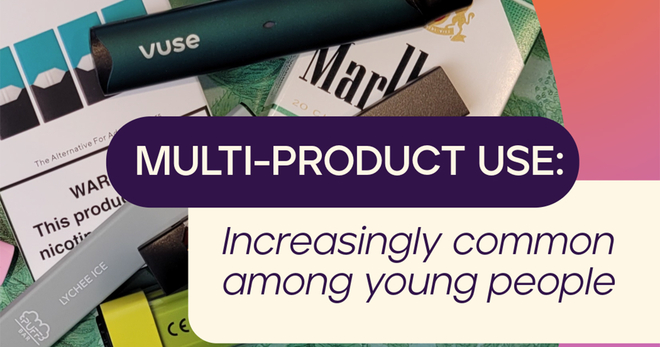Where does e-cigarette regulation stand today?
Youth e-cigarette use has reached “epidemic proportions,” according to the Food and Drug Administration in late 2018, yet the devices are still sold in a relatively unregulated environment that gives today’s young people access to the appealing and potentially addictive products.
E-cigarette use has surged among young people — many of whom never smoked cigarettes — growing 78% among high schoolers and 48% among middle schoolers in just one year from 2017 to 2018. JUUL, which accounts for three-quarters of the U.S. e-cigarette market, is driving the epidemic and has some of the highest nicotine content available among e-cigarettes. JUUL and other e-cigarettes also come in a variety of kid-friendly flavors that have been proven to attract young people.
Despite the high stakes, these products have so far been allowed to stay on the market nearly unchecked. In 2017, the FDA decided to allow e-cigarettes to remain on the market through August 2022 without its review and has not made moves to reverse this decision. That means e-cigarettes on sale today have not undergone a review of their public health impact through the agency’s review process for tobacco products.
Recent developments underscore where e-cigarette regulations stand today and the urgent action needed to protect today’s young people.
The new FDA commissioner signaled he will not act on e-cigarettes until 2021.
Will the acting FDA commissioner continue to fight the e-cigarette epidemic?
Former FDA Commissioner Scott Gottlieb proposed actions to stem the skyrocketing youth use of e-cigarettes, including restricting flavors, but stopped short of exercising the agency’s full authority to conduct meaningful premarket review of all new tobacco products. Instead, he proposed to move up review of e-cigarettes by 12 months from August 2022 to August 2021, which is still three years beyond the original deadline.
After taking over the agency in March, acting FDA Commissioner Ned Sharpless signaled that he will not take immediate action to stem the epidemic, according to a press release from U.S. Senator Dick Durbin. After meeting with the commissioner to discuss kid-friendly flavors in tobacco products and urging him to remove these flavored products from the market, Durbin said that Sharpless “has absolutely no intention of taking legal action he is empowered to take to protect our nation’s children from the addiction of e-cigarettes. Dr. Sharpless made it very clear that no action would be taken to ban kid-friendly vaping flavors during this President’s term in office.”
This development is at odds with previous statements from Sharpless about continuing plans to hold the industry accountable for the youth e-cigarette epidemic. The epidemic is an urgent crisis that calls for immediate, meaningful action from the FDA to protect young people from a lifetime of nicotine addiction.
Legal actions are putting pressure on the FDA and JUUL.
What legal action is being taken against JUUL
On May 15, a pair of court developments related to the FDA and JUUL highlighted the urgency of regulatory action.
A federal judge ruled that the FDA acted illegally by deciding to allow e-cigarettes to remain on the market until 2022 before applying for FDA authorization and by permitting products to remain on the market indefinitely during review.
The judge gave the plaintiffs 14 days to communicate what remedial action they want ordered and the FDA 14 days to respond. The lawsuit was filed by public health groups and pediatricians, including the American Academy of Pediatrics and its Maryland chapter, American Cancer Society Cancer Action Network, American Heart Association, American Lung Association, Campaign for Tobacco-Free Kids and Truth Initiative®.
On the state level, North Carolina filed a lawsuit against JUUL for “designing, marketing, and selling e-cigarettes in ways that it knows will attract minors and deceptively downplaying the potency and danger of the nicotine in its e-cigarettes.” The suit, led by state Attorney General and Truth Initiative board member Josh Stein, aims to remove all flavors — including mint — from the market and require a ban on marketing aimed at minors.
Congress moves to raise minimum age to buy tobacco to 21.
What is the minimum age to buy tobacco and e-cigarettes?
To address the youth e-cigarette use epidemic, Congress has introduced two bipartisan bills — one from Senate Majority Leader Mitch McConnell and Senator Tim Kaine, and one from representatives Brian Schatz and Todd Young — to raise the federal minimum age to buy tobacco from 18 to 21. Representatives Frank Pallone, Jr. and Donna Shalala also announced a more comprehensive tobacco control bill this spring that included a Tobacco 21 policy.
Many states and localities have already enacted Tobacco 21 laws, measures that have potential to save lives at the local level. While important, these policies are not enough to address the epidemic and are not a replacement for FDA action. Additionally, with the tobacco industry recently coming out in support of these measures, there is concern that Tobacco 21 gives cover to the industry and distracts from the many other actions needed to protect young people.
Truth Initiative is continuing to push for more action to prevent e-cigarettes from addicting a new generation and turning back the clock on decades of progress in the fight against tobacco. These actions include eliminating flavors, banning online sales, restricting marketing appealing to youth and requiring a thorough premarket review of e-cigarettes.
For more information on protecting young people from e-cigarettes, read “Action Needed: E-cigarettes.”
More in emerging tobacco products
Want support quitting? Join EX Program
By clicking JOIN, you agree to the Terms, Text Message Terms and Privacy Policy.
Msg&Data rates may apply; msgs are automated.


